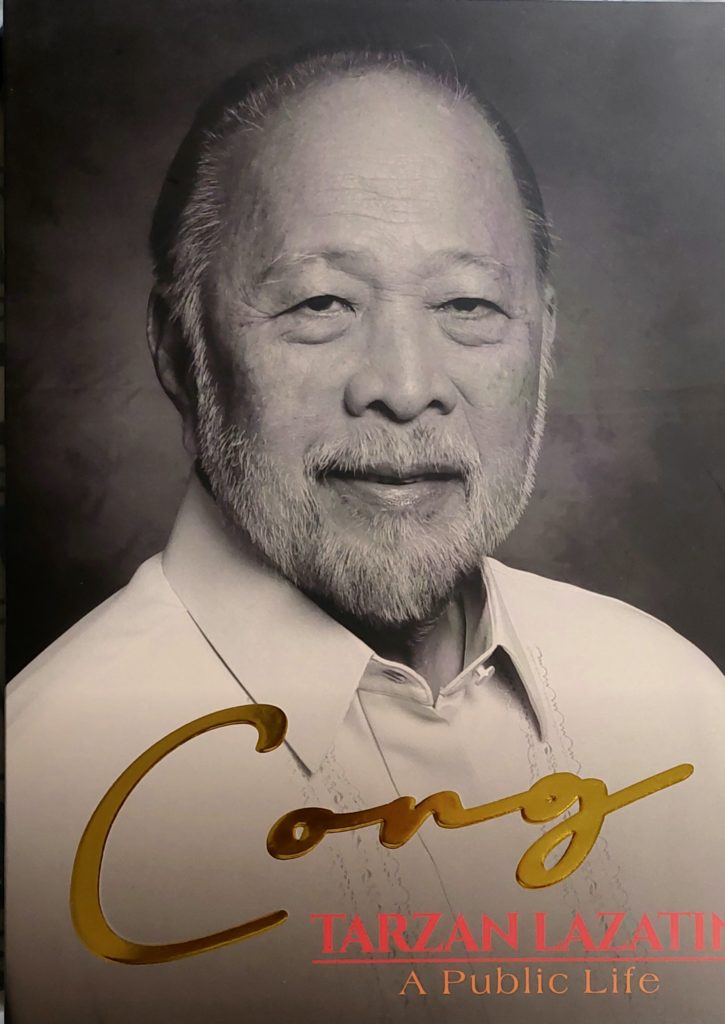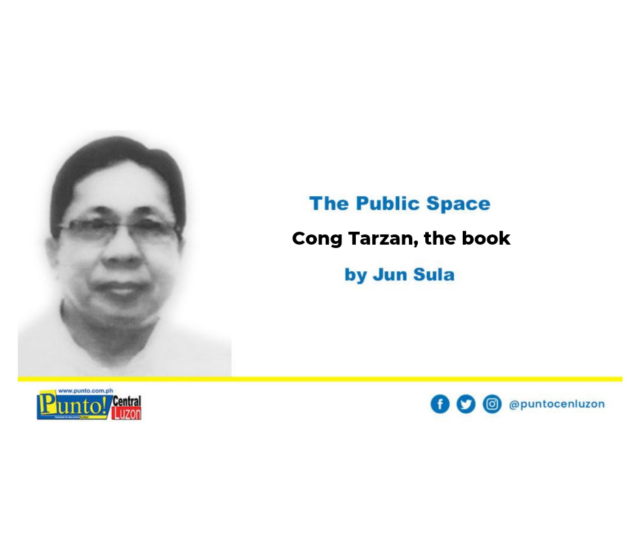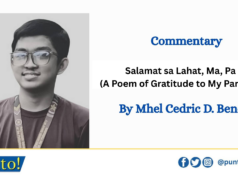IF A public leader or public servant, as the case may be, is defined by his politics, how is his legacy be framed? By his character, on one side, or by achievements, on the other? Ideally, integrity says it should be firmly held by both.

In “Tarzan Lazatin, A Public Life”, the reader is deliberately, ultimately led to the ineluctable conclusion that one cannot go without the other. Character without achievements is bogus. Achievements without character are hollow. The book rubs these in on the reader often enough, it’s hard to miss. More to the point, that touchable flesh-and-blood legends can really emerge from such visible stuff.
By these alone, the book is already worth its cost.
Politics, according to the short and simple gospel of Tarzan, the legendary Pampanga politician whose public influence exceeded his personal eloquence, need not be complicated, let alone messy. His political slogan, all six words that can easily pass for an haiku verse, sums it all up: ditak a salita, dakal a gawa. In modern lingo: talk is cheap.
No one can argue against the efficacy and simplicity – the bottom line, success — of his political doctrine that had stood the test of time. In her foreword to the book, former President GloriaMacapagal Arroyo is clearly awed, if not mystified, by the enigmatic politician who” magnified his few soft spoken words by the eloquence of his projects, programs and public service”. It was more than political politesse; she knew whereof she spoke.
Tarzan’s fruitful public life hugely attests to the validity of his immutable conviction. The skillful authors needed more than 200 pages to convey a substantive portrait of a man who had served as congressman in Pampanga’s first district for five terms, 1987, 1992, 1995, 2007 and 2010, and the first three-term mayor of Angeles City from 1998 to 2007. In the process, his service span both in the legislative and executive, left a certain standard, a distinct brand, of politics.
In hindsight, it’s epical how Tarzan had calmly but correctly responded to the political evolution in the country at the time he did, moving from strength to strength with each new president, four of them in succession, with distinct ideology or none at all. How he wrapped himself up in the evolution, a salient point the book understandably glossed over, is a fair challenge to political scholars to scrutinize in detail.
Tarzan was a political offspring of the EDSA Revolution of 1986 when he won as Cory’s choice for congressman in 1987. He used the magical victory subsequently like Aladdin on his flying carpet with Cory’s successors, Fidel Ramos, Joseph Estrada, Gloria Macapagal Arroyo and Noynoy Aquino. He was exceptional, if not phenomenal, in how he understood well and smartly placed his bets in the chaotic logic of the political continuum triggered by the EDSA upheaval.
“A good book has no ending” wrote R.D. Cummins. In a sense, a big nod to the book. While In it generously cascaded a delectable salad of facts to the reader, it also inevitably gave rise to curious hunger for more about the political caballero whose life had spawned some old chestnuts beyond his turf,political and personal. The book has many magnet-like propulsions to relevant questions.
But the book’s title is very explicit, if not apologetic: what is private remains sacred ground, inviolable; what is public is largely accessible, a movable feast, like the world-famous giant sisig Tarzan once inaugurated.
Shortly after the late Cory Aquino ascended to the presidency, I was asked to report for work at a government agency whose director surprised me with a question as intimate as it was interesting. “How’s Tarzan?”, Louie Villareal asked me matter-of-factly when he learned I was from Pampanga. Before I could draw an answer from the little I knew about Tarzan at the time, Villareal, Tarzan’s former classmate in New York, smilingly retold the old story of how Tarzan’s classmates in Spain learned more Kapampangan from him than he did Spanish from them. Did he achieve the same feat in the City of Apples? Villareal didn’t add to either the real or apocryphal.
In a bigger sense, Tarzan exuded the two important attributes of an effective politician Machiavelli has expounded on: virtu and fortuna, roughly ingenuity and luck. Tarzan had both, with the latter as obvious as his rugged patrician bearing. The former would be amply displayed through his 30 years or so foray into the exacting demands of Philippine politics that, at the end of the day, didn’t leave a visible scar in Tarzan’s life. Arroyo hit a resonant chord when she emphasized “the great fundamental values that guided his life’.
There are supposed to be no saints in politics, one philosopher warned. Could Tarzan have been conceivably different? Even the late Pampanga governor Bren Z. Guiao once acknowledged with conviction that Tarzan was the best there was in his time. In Plato’s words, he was an expert who could be efficient and fair, even flexible. Guiao knew easily who could be his best proxy during my wedding in 1993. But was Tarzan wholly objective in being dismissive of the late Levy P. Laus as just “a good car salesman”? Unfortunately, politicians usually have the last, if blunt, word.
The book, superbly written and edited by Bong Lacson, Pampanga media’s enfant terrible as the late Ram Mercado would say, with valuable contributions and insights from equably excellent media practitioners, highlighted at least two titillating puzzles whose answers are left to the wild and wandering fertile imaginations. How did lawyer Arlene Buan snatched defeat from the jaws of victory in the congressional election against Tarzan in_1987. Why did Tarzan, all of a sudden, stop his recall move against Angeles City’s seven councilors in 2002? What if Buan decided not to hie off and away to the US while his protest was pending? What if Tarzan did not change his mind about the recall on the so-called ‘7 Dwarfs’?
Once , then Congressman Yeng Guiao invited Sen. Frank Drilon to lunch in his hometown Magalang, along with local officials, among them then Mabalacat Mayor Boking Morales. Drilon nearly dropped his jaw when he was told that Morales was way over the Constitutional limits for a local executive. Asked by Drilon how he did it, Morales sheepishly mumbled political contingencies and legal procedures, at the friendly threat by Drilon that he would initiate a Senate probe.
In truth, Tarzan had a lot to do with it. He was instrumental in granting Mabalacat a sizeable share from the taxes Clark earned from its investors. He was also the author of the law that gave Mabalacat its city status. The new status plus the new money gave Morales more tools and teeth to his political clout,and a longer hold on the mayoralty. Without Tarzan’s support, Morales would have exited from local politics much earlier. One page in the book tells it all, and Yeng should have no doubt about where Morales’ loyalty and gratitude really are, now and forever, and where the convenient lie isn’t.
There is one ‘sin of omission’ in the book though: it failed to mention that Tarzan’s mother was from Magalang where the two political combatants for mayorship, incumbent Romulo Feliciano Pecson and his predecessor, Malu Paras Lacson, are likely relatives, distant or not.
Otherwise, it’s a virtual template for aspiring politicians anywhere, and a fair caveat as well, that Tarzan might have left a proven path to his two rising sons , both wearing his name well, to faithfully follow as they look ahead to a bright political future. So far, so good.





